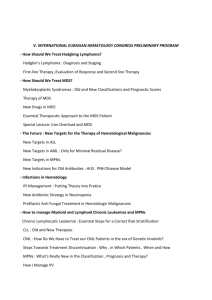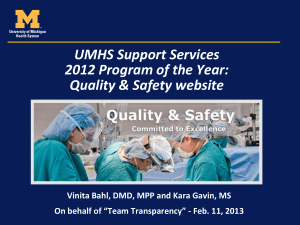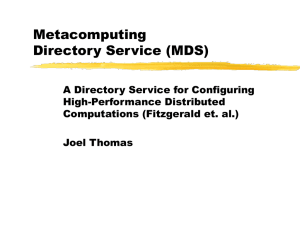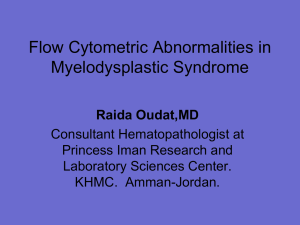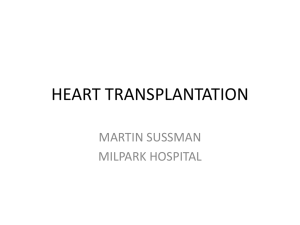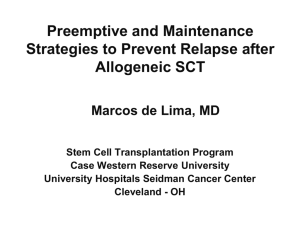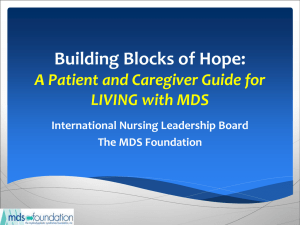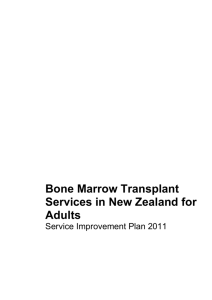Transplantation for Myelodysplasia
advertisement
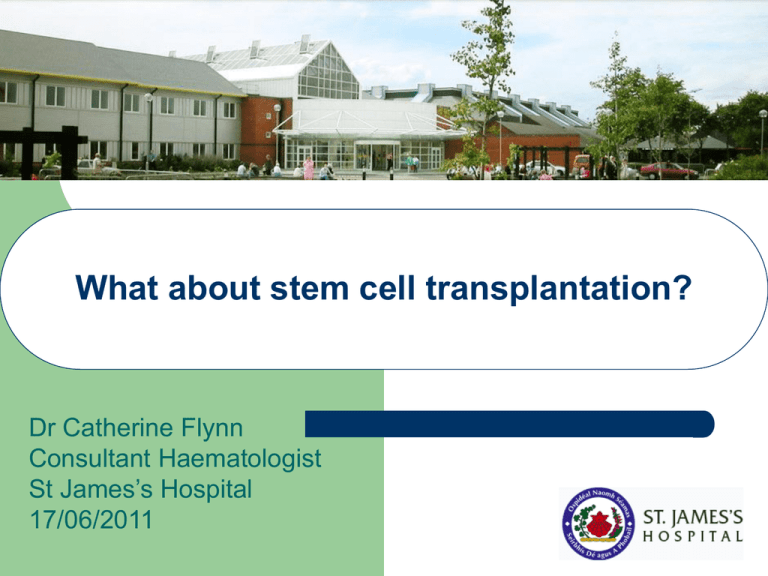
What about stem cell transplantation? Dr Catherine Flynn Consultant Haematologist St James’s Hospital 17/06/2011 What is Myelodysplasia? Stem cell disorder with a variable clinical course Treatment strategy with the highest curative potential is an allogeneic stem cell transplant Incidence LRF;Leeds UK MDS transplant Activity Increase in the number of reduced intensity transplants Increase in the number of unrelated donor transplants Increase in patients >50 years Current transplant activity in MDS EBMT 2008: – 1147 allografts for MDS ~ 10% of total 1998-2006 – 1333 MDS patients > 50yrs allografted Types of transplant Autograft Allogeneic Syngeneic Myeloablative/traditional Mini-transplant/reduced intensity MA Allogeneic 2009: Disease Indication Myelofibrosis 3% SAA 3% MDS 16% ALL 33% AML n=10 APML n=1 CML n=2 Lymphoma 11% Lymphoma n=4 MDS n=6 CML 5% APML 3% ALL n=13 Myelofibrosis n=1 AML 26% SAA n=1 RIC Allogeneic Transplants 2009: Disease Indication Myelofibrosis 5% Multiple Myeloma 5% MDS 5% Waldenstroms 5% AML 38% Hodgkin's Disease 5% Lymhoma 21% CLL 16% AML n = 7 CLL n=3 Lymhoma n=4 Hodgkin's Disease n=1 MDS n=1 Multiple Myeloma n=1 Myelofibrosis n=1 Waldenstroms n=1 Patient Factors Patient Wishes + Support Age and Performance Co-Morbidities Transfusions/Iron Status Infection Disease Factors Stage MRD Previous Treatment Indolent/Proliferative Extramedullary Disease Curative Potential Mc Clune et al JCO Outcomes (Kroger MDS ESH meeting) Survival without relapse Mortality without relapse Relapse 29-40% 37-50% 23-48% Early Consideration of Transplant Potential candidates should have a donor search and be referred for discussion Timing Is important…… Delaying SCT can result in maximising overall survival for low and intermediate risk MDS (Cutler et al) Optimal Timing Time of a new cytogenetic abnormality Appearance of a clinically significant cytopenia Increase in the percentage of bone marrow blasts Net benefit or loss overall discounted life expectancy for the 4 IPSS . risk groups are shown above and below the x-axis. Cutler C S et al. Blood 2004;104:579-585 ©2004 by American Society of Hematology Patients over 60 excluded, MA conditioning only Co-Morbidities – – – – – – – Lung problems Liver problems Joint/Bone problems Psychiatric disorders Previous other cancer Stomach Ulcer Brain/stroke illness Performance Score Biological Age Chronological Age Physical Function Organ co-morbidities Ability to withstand the harshness of chemoradiotherapy To process different medications and large volumes of fluid To tolerate serious infections and harmful effects of GVHD Disease Stage Low Risk MDS High Risk MDS Chromosomes Count….. 46, XY [80%] 46, XY, del (5q)(q11q33), del (7q)(q11q36) [20%]. International prognostic Scoring System WHO Prognostic Scoring System Number of transfusions and iron overload High Ferritin pre transplant is associated with a poor survival To make a treatment decision or a risk assessment in any patient…. Patient factors – medical co-morbidity Disease Factors – Cytogenetics, Transfusion/Iron, WHO subtype Impact not yet known…… Timing of Transplant Chemotherapy before HCT or not ? Miss A 24 year old girl referred in 2008 with anaemia Hb=9.7g/DL, normal WCC and platelet count Karyotype normal Bone marrow Refractory Cytopenia and multilineage dysplasia April 2011 Hb= 8.8g/DL ? Consider Transplant What to do?? IPSS score = 0, WPSS =1 Low risk MDS No sibling donor Defer transplant at present Mrs B 56 year old lady seen in September 2010 Hb 9.1, platelets 41, WCC 1.2 Normal karyotype Bone marrow refractory cytopenia and ring sideroblasts Not requiring Transfusions HLA matched sibling What to do? IPSS= 0.5, WPSS =1 Low risk MDS Defer transplant at present Update January 2011 Increasing transfusion requirment Bone marrow and karyotype unchanged March 2011 reduced intensity sibling transplant Currently 80 days post transplant with skin and liver GVHD Mrs C 46 year old woman Presented June 2008 Hb 7, WCC 3, Plats = 53 Bone marrow 7% blasts Complex karyotype No sibling donor What did we do? IPSS Int-2 Unrelated donor search started 2 courses of chemotherapy Unrelated transplant May 2009 Some minor liver GVHD Unfortunately…. Died May 2011 with pneumonia Delayed immune recovery Myeloablative Vs Reduced Intensity High TRM Low relapse Low TRM Higher relapse Transplant Complications Immune Recovery Mackall et al BMT 2009 Questions……
